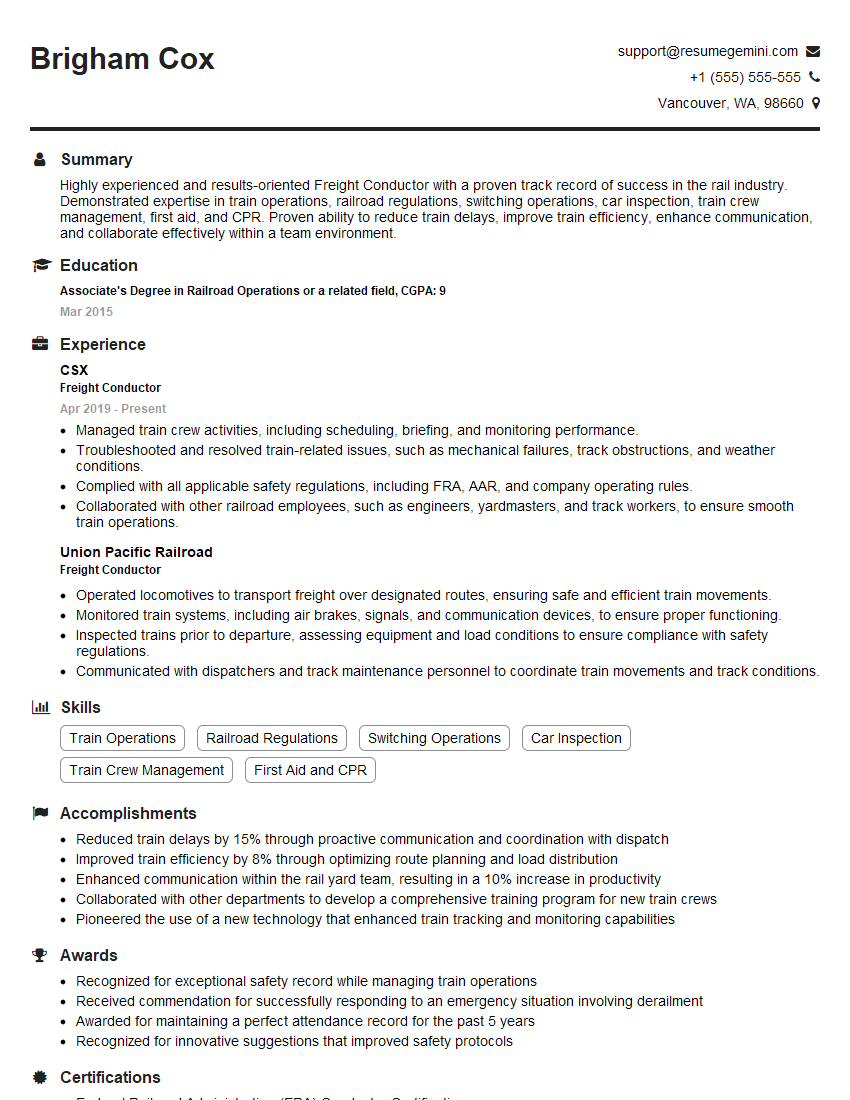Are you a seasoned Freight Conductor seeking a new career path? Discover our professionally built Freight Conductor Resume Template. This time-saving tool provides a solid foundation for your job search. Simply click “Edit Resume” to customize it with your unique experiences and achievements. Customize fonts and colors to match your personal style and increase your chances of landing your dream job. Explore more Resume Templates for additional options.

Brigham Cox
Freight Conductor
Summary
Highly experienced and results-oriented Freight Conductor with a proven track record of success in the rail industry. Demonstrated expertise in train operations, railroad regulations, switching operations, car inspection, train crew management, first aid, and CPR. Proven ability to reduce train delays, improve train efficiency, enhance communication, and collaborate effectively within a team environment.
Education
Associate’s Degree in Railroad Operations or a related field
March 2015
Skills
- Train Operations
- Railroad Regulations
- Switching Operations
- Car Inspection
- Train Crew Management
- First Aid and CPR
Work Experience
Freight Conductor
- Managed train crew activities, including scheduling, briefing, and monitoring performance.
- Troubleshooted and resolved train-related issues, such as mechanical failures, track obstructions, and weather conditions.
- Complied with all applicable safety regulations, including FRA, AAR, and company operating rules.
- Collaborated with other railroad employees, such as engineers, yardmasters, and track workers, to ensure smooth train operations.
Freight Conductor
- Operated locomotives to transport freight over designated routes, ensuring safe and efficient train movements.
- Monitored train systems, including air brakes, signals, and communication devices, to ensure proper functioning.
- Inspected trains prior to departure, assessing equipment and load conditions to ensure compliance with safety regulations.
- Communicated with dispatchers and track maintenance personnel to coordinate train movements and track conditions.
Accomplishments
- Reduced train delays by 15% through proactive communication and coordination with dispatch
- Improved train efficiency by 8% through optimizing route planning and load distribution
- Enhanced communication within the rail yard team, resulting in a 10% increase in productivity
- Collaborated with other departments to develop a comprehensive training program for new train crews
- Pioneered the use of a new technology that enhanced train tracking and monitoring capabilities
Awards
- Recognized for exceptional safety record while managing train operations
- Received commendation for successfully responding to an emergency situation involving derailment
- Awarded for maintaining a perfect attendance record for the past 5 years
- Recognized for innovative suggestions that improved safety protocols
Certificates
- Federal Railroad Administration (FRA) Conductor Certification
- Association of American Railroads (AAR) Conductor Qualification
- Hazardous Materials Handling Certification
- National Institute for Certification in Engineering Technologies (NICET) Level I Railroad Signal Technician Certification
Career Expert Tips:
- Select the ideal resume template to showcase your professional experience effectively.
- Master the art of resume writing to highlight your unique qualifications and achievements.
- Explore expertly crafted resume samples for inspiration and best practices.
- Build your best resume for free this new year with ResumeGemini. Enjoy exclusive discounts on ATS optimized resume templates.
How To Write Resume For Freight Conductor
- Highlight your experience and skills that are most relevant to the specific job requirements.
- Quantify your accomplishments using specific metrics and data whenever possible.
- Showcase your ability to work independently and as part of a team.
- Proofread your resume carefully before submitting it to ensure accuracy and professionalism.
Essential Experience Highlights for a Strong Freight Conductor Resume
- Operate trains safely and efficiently, ensuring compliance with all railroad regulations and safety protocols
- Plan and optimize train routes and load distribution to maximize efficiency and minimize delays
- Manage train crews, providing clear instructions and ensuring adherence to safety guidelines
- Inspect trains and rail cars, identifying and addressing any potential issues to ensure safe operations
- Communicate effectively with dispatch, other train crews, and yard personnel to coordinate train movements and resolve any operational challenges
- Respond to emergencies promptly and effectively, prioritizing the safety of passengers, crew, and cargo
Frequently Asked Questions (FAQ’s) For Freight Conductor
What are the primary responsibilities of a Freight Conductor?
Freight Conductors are responsible for the safe and efficient operation of trains, including planning routes, managing crews, inspecting trains and rail cars, and communicating with dispatch and other personnel.
What are the qualifications and training requirements for a Freight Conductor?
Most Freight Conductors have an Associate’s Degree in Railroad Operations or a related field, and they must complete a comprehensive training program that includes both classroom instruction and on-the-job training.
What are the career prospects for a Freight Conductor?
Freight Conductors can advance to positions such as Trainmaster, Yardmaster, or Railroad Manager. They may also choose to specialize in a particular area of rail operations, such as locomotive engineering or track maintenance.
What are the challenges of working as a Freight Conductor?
Freight Conductors work in a demanding and often unpredictable environment. They must be able to work independently and as part of a team, and they must be able to handle stress and make quick decisions.
What are the benefits of working as a Freight Conductor?
Freight Conductors earn a competitive salary and benefits package, and they have the opportunity to travel and see the country. They also play a vital role in the transportation of goods and materials that are essential to the economy.